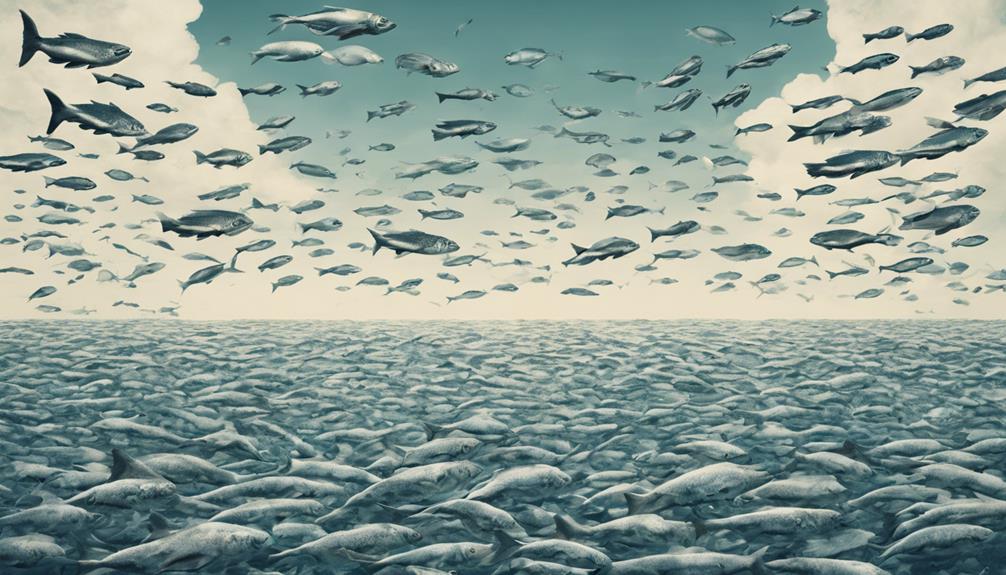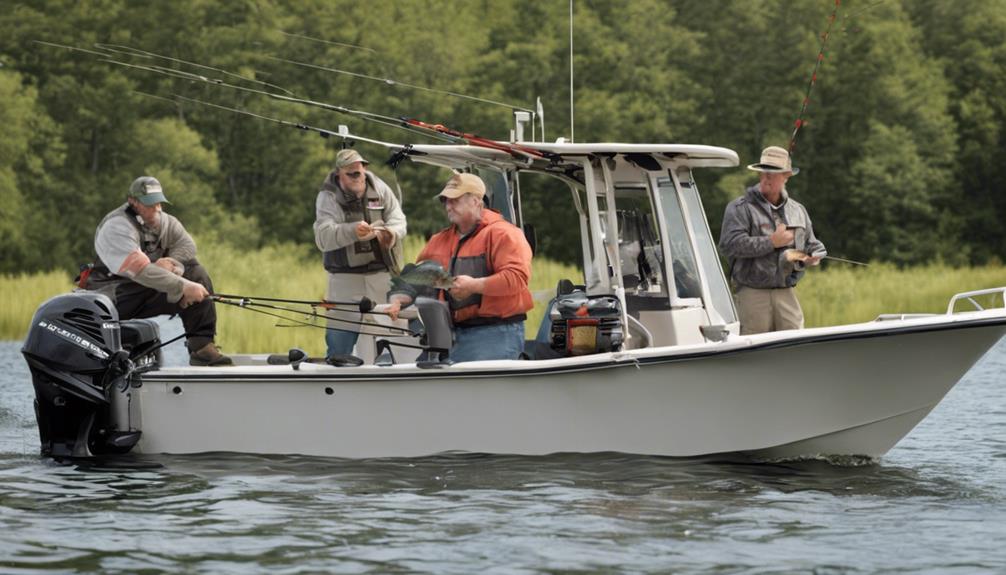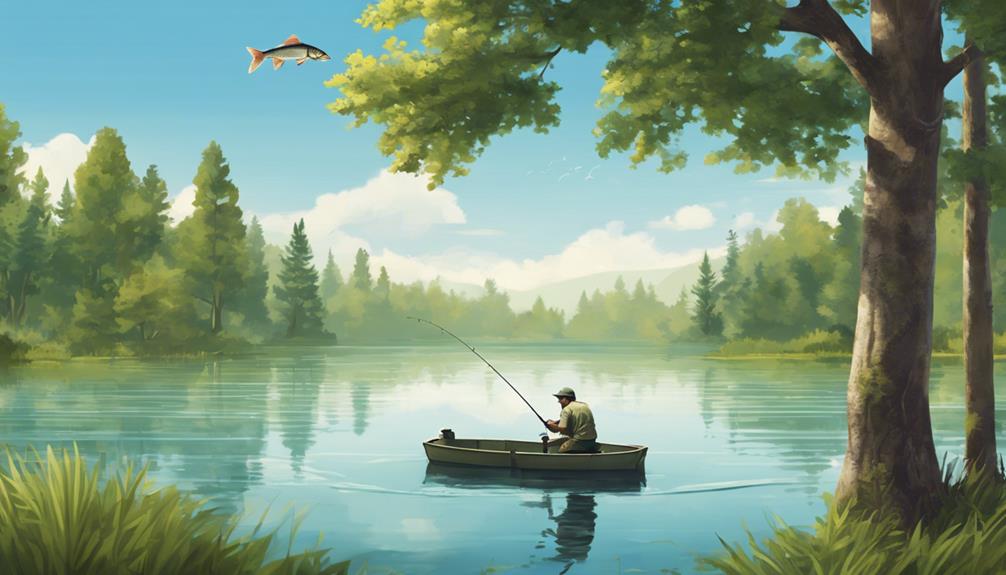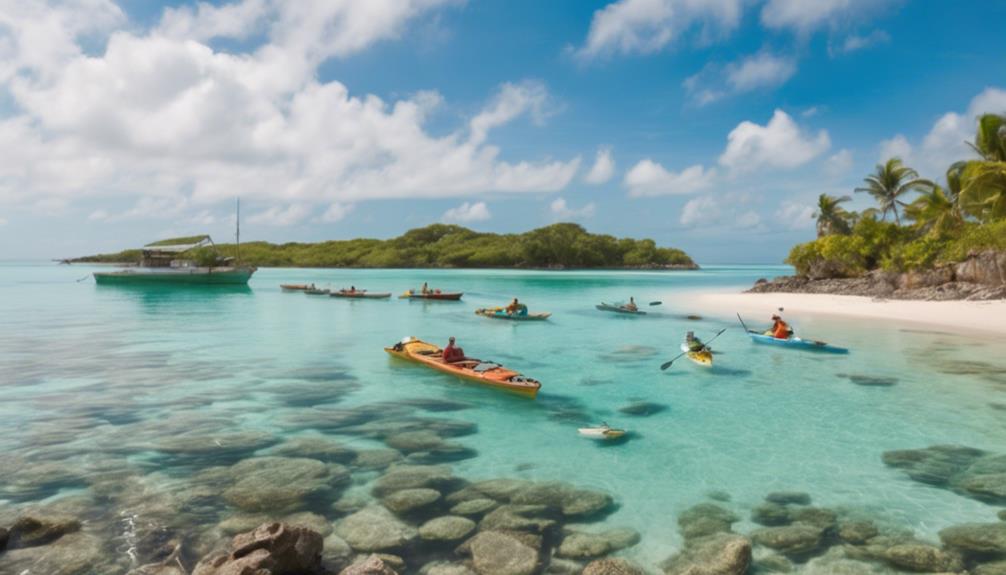You know the saying, 'Don't put all your eggs in one basket'? Well, in the vast ocean, marine life is like those eggs, delicately balanced and interconnected. Overfishing disrupts this delicate balance, leading to a domino effect that impacts more than just the fish.
The consequences ripple through the entire marine ecosystem, causing a chain reaction that ultimately affects us all. So, how does overfishing truly devastate marine life beyond just depleting fish populations?
Decline in Fish Population
As overfishing continues unchecked, fish populations are rapidly dwindling. Stock assessment, a crucial tool in managing fisheries, provides data on fish populations to prevent overfishing. However, inadequate assessments or ignoring the data can lead to severe consequences. Climate change further exacerbates the situation, impacting fish habitats and migration patterns.
Stock assessment involves collecting data on fish populations to determine their health and sustainability. This information guides policymakers in setting catch limits to prevent overfishing and ensure the long-term viability of marine species. When stock assessments aren't conducted effectively or their results are disregarded, it can result in the overexploitation of fish stocks. This overexploitation leads to a rapid decline in fish populations, threatening the balance of marine ecosystems.
Climate change adds another layer of complexity to the decline in fish populations. Rising sea temperatures, ocean acidification, and changes in currents affect the availability of food and suitable habitats for many fish species. As a result, fish may need to migrate to different areas to survive, disrupting established ecosystems and fishing patterns. The combined pressures of overfishing and climate change create a dire situation for marine life, highlighting the urgent need for sustainable fishing practices and global action to mitigate these threats.
Disruption of Marine Ecosystems
With marine ecosystems under increasing pressure from overfishing and climate change, the delicate balance of ocean life is being severely disrupted. This disruption has far-reaching consequences for the intricate web of life that exists within the oceans.
Key Points on the Disruption of Marine Ecosystems:
- Ecosystem Imbalance: Overfishing disrupts the natural balance within marine ecosystems by depleting key species. Removing certain fish species in large numbers can lead to imbalances, affecting the entire ecosystem's stability.
- Marine Food Webs: Overfishing alters marine food webs as predator-prey relationships are disturbed. When the population of a specific fish species declines due to overfishing, it can result in a cascading effect throughout the food chain, impacting other species dependent on it for food.
- Habitat Destruction: Overfishing practices often involve damaging fishing methods that harm essential habitats like coral reefs and sea floors. This destruction further contributes to the disruption of marine ecosystems, affecting not only fish populations but also other marine life that rely on these habitats for shelter and food.
The disruption of marine ecosystems due to overfishing highlights the urgent need for sustainable fishing practices to preserve the delicate balance of ocean life. By addressing these issues, we can work towards restoring and protecting marine ecosystems for future generations.
Loss of Biodiversity
The depletion of key species through overfishing not only disrupts marine ecosystems but also leads to a significant loss of biodiversity. When certain species are overfished, their populations dwindle, causing ripple effects throughout the entire ecosystem. This decline in biodiversity can have far-reaching consequences, impacting the delicate balance of marine ecosystems.
Ecosystem balance is crucial for the health and stability of marine environments. Each species plays a unique role in maintaining this balance, and when key species are removed through overfishing, it disrupts the natural order. For example, the removal of large predatory fish can lead to an explosion in the population of their prey species, causing cascading effects down the food chain.
Genetic diversity within species is also essential for their resilience to environmental changes. Overfishing can reduce genetic diversity by targeting specific individuals within a population, potentially leading to decreased adaptability and survival rates. This loss of genetic diversity weakens the overall health of marine populations and makes them more susceptible to diseases and other threats.
Impact on Food Chain
Overfishing disrupts the natural balance of marine ecosystems by causing cascading effects on the food chain. When certain fish populations are overexploited, it leads to a trophic imbalance in the ecosystem, affecting the interconnected web of species that rely on each other for survival.
Key Points:
- Trophic Imbalance: Overfishing disrupts the trophic levels within the food chain. Removing certain top predators can lead to an overabundance of their prey, causing a ripple effect throughout the ecosystem. This imbalance can result in a decline in species further down the food chain, as they may face increased predation or competition for resources.
- Ecosystem Collapse: The predatory shortage caused by overfishing can trigger a domino effect that ultimately leads to ecosystem collapse. Without enough predators to keep prey populations in check, these prey species can proliferate unchecked. This explosion in prey abundance can have detrimental effects on the overall health and stability of the ecosystem.
- Predatory Shortage, Prey Abundance: Overfishing not only depletes predator populations but also leads to an abundance of prey species. This imbalance disrupts the intricate relationships between species in the food chain, ultimately jeopardizing the functioning of the entire ecosystem.
Destruction of Habitats
Disrupting the natural balance of marine ecosystems through overfishing also leads to the destruction of habitats critical for the survival of various species. When large numbers of fish are removed from the ocean at unsustainable rates, it not only impacts the population of the targeted species but also sets off a chain reaction that affects the entire ecosystem. Habitat destruction is a significant consequence of overfishing, as certain fishing practices can damage essential marine environments like coral reefs, mangroves, and sea grass beds. These habitats provide food, shelter, and breeding grounds for countless marine species, and their destruction disrupts the delicate balance of the ecosystem.
Overfishing contributes to ecosystem imbalance by depleting key species that play vital roles in maintaining the health of their habitats. For example, the removal of predatory fish can lead to an explosion in the population of their prey, causing cascading effects throughout the food chain. Additionally, bottom trawling, a common fishing method, involves dragging heavy nets along the seafloor, destroying everything in their path, including sensitive habitats and the organisms that rely on them.
As habitats are degraded or lost due to overfishing, many marine species face a loss of essential resources and safe spaces for reproduction. This habitat destruction not only threatens individual species but can also have far-reaching consequences for the overall biodiversity and resilience of marine ecosystems. By understanding the connection between overfishing, habitat destruction, and ecosystem imbalance, we can work towards more sustainable fishing practices to protect the health and diversity of our oceans.
Threatened Species and Extinction
Impact of Overfishing on Threatened Species and Extinction
Elevated fishing pressure is driving many marine species towards the brink of extinction, highlighting the urgent need for conservation efforts. This relentless pursuit of fish stocks has put various species at risk of disappearing forever from our oceans.
To understand the gravity of the situation, consider the following:
- Conservation measures: Implementing strict regulations and sustainable fishing practices are crucial to protect endangered species. By establishing marine protected areas and enforcing catch limits, we can help safeguard vulnerable populations from further decline.
- Endangered species: Overfishing disproportionately affects species that are already classified as endangered. The continuous extraction of these populations can push them past the point of recovery, leading to irreversible consequences for marine biodiversity.
- Collateral damage: Indiscriminate fishing methods not only target the desired species but also result in the unintentional capture of non-targeted species, known as bycatch. This phenomenon contributes to the decline of various marine animals, including turtles, seabirds, and marine mammals.
To prevent the loss of biodiversity and protect the delicate balance of marine ecosystems, immediate action is required. By prioritizing conservation efforts and promoting sustainable fishing practices, we can mitigate the threats posed by overfishing and work towards a healthier future for our oceans.
Economic Consequences
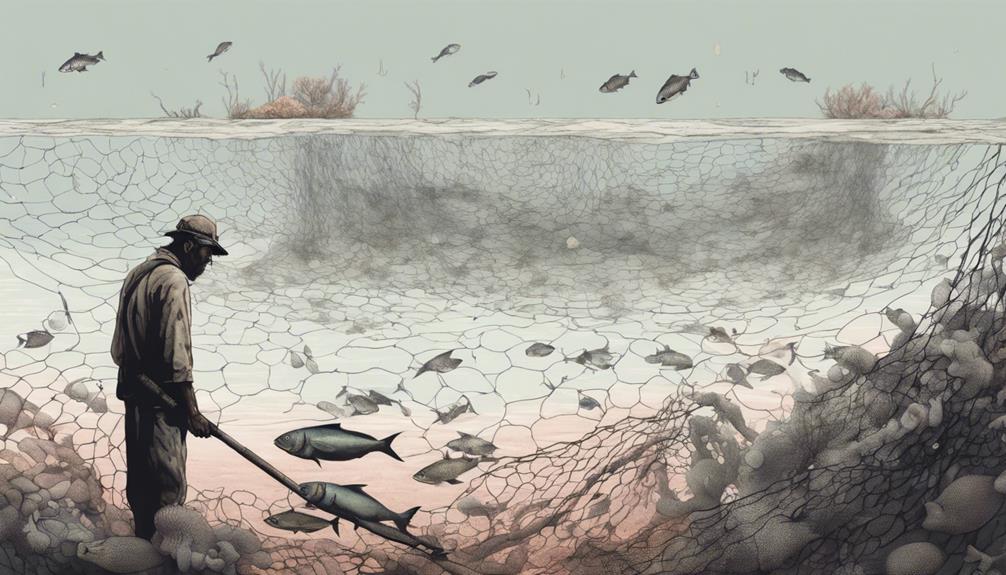
Considering the depletion of fish stocks and the strain on maritime economies, understanding the economic consequences of overfishing is crucial. Overfishing not only threatens marine ecosystems but also has significant economic impacts. One key consequence is the imbalance between market demand and the ability of fish populations to replenish themselves sustainably. As fish stocks decline, meeting the demand for seafood becomes increasingly challenging, leading to higher prices and potential shortages.
Resource management and policy decisions play a critical role in mitigating these economic consequences. Sustainable fishing practices are essential to ensure the long-term viability of fisheries and the stability of maritime economies. Effective management strategies, such as implementing catch limits and protected areas, are necessary to prevent overexploitation of fish stocks. By aligning policies with scientific recommendations and conservation efforts, governments can support the economic sustainability of fishing industries.
Failure to address the economic implications of overfishing can have far-reaching effects on coastal communities that rely on fishing for their livelihoods. Declines in fish populations can lead to job losses, reduced incomes, and increased poverty among those dependent on the fishing industry. By prioritizing sustainable practices and making informed policy decisions, stakeholders can work towards a future where marine resources are preserved, economies thrive, and communities prosper.
Regulatory and Conservation Efforts
To address the challenges of overfishing and its consequences, proactive regulatory and conservation efforts are essential. Implementing sustainable practices and fostering international cooperation are crucial steps in safeguarding marine ecosystems.
- Embracing Sustainable Practices: Encouraging sustainable fishing practices, such as implementing catch limits and using selective fishing gear, helps prevent the depletion of fish populations. By promoting responsible fishing methods, we can ensure the long-term viability of marine resources for future generations.
- Utilizing Technology Advancements: Leveraging technology advancements, such as satellite tracking and underwater drones, enhances monitoring systems and enables authorities to enforce regulations more effectively. Real-time data on fishing activities and marine life populations empower decision-makers to take timely actions to mitigate overfishing impacts.
- Enhancing International Cooperation: Overfishing is a global issue that requires collaborative efforts across borders. Strengthening international cooperation through agreements and initiatives like the United Nations Fish Stocks Agreement fosters coordinated action to manage fish stocks sustainably. By working together, countries can combat illegal fishing practices and ensure the conservation of marine biodiversity.
Frequently Asked Questions
How Do Overfishing Practices Affect the Livelihoods of Coastal Communities and Small-Scale Fishermen?
When overfishing occurs, it directly impacts the livelihoods of coastal communities and small-scale fishermen. Economic impacts are significant as depleted fish stocks lead to reduced catches, affecting income levels and stability.
Social consequences include increased competition for dwindling resources, potentially leading to conflicts among fishermen. Finding sustainable fishing practices is crucial to safeguard both the economic well-being and social harmony of these communities.
What Are the Long-Term Effects of Overfishing on the Marine Environment, Beyond Just the Decline in Fish Populations?
When you overfish, the long-term effects on the marine environment go beyond just dwindling fish populations. Ecosystem dynamics are thrown off, leading to biodiversity loss and habitat destruction.
Marine conservation efforts are hindered, impacting not just fish but entire ecosystems.
It's crucial to understand that overfishing doesn't just affect fish—it disrupts the delicate balance of life in the ocean, causing far-reaching consequences for marine life and human communities that depend on it.
How Does Overfishing Contribute to the Increase in Bycatch and the Unintentional Capture of Non-Target Species?
When you overfish, you deplete fish populations, leading to more bycatch and unintentional capture of non-target species. Bycatch management becomes challenging, impacting marine biodiversity and ecosystem balance.
Conservation efforts are crucial to address this issue and protect vulnerable species. Implementing sustainable fishing practices can help reduce bycatch and preserve the delicate equilibrium of marine ecosystems, ensuring a healthier future for all species in the ocean.
What Role Do Technology and Advancements in Fishing Methods Play in Exacerbating the Issue of Overfishing?
When it comes to overfishing, technology and fishing advancements have a big impact. These advancements can lead to more efficient fishing practices, which in turn can exacerbate the issue of overfishing.
This can have serious ecological consequences, threatening marine biodiversity. Additionally, the socio-economic impacts can be severe, affecting the livelihoods of fishing communities and disrupting the balance of marine ecosystems.
How Do Climate Change and Other Environmental Factors Interact With Overfishing to Further Impact Marine Ecosystems?
When you consider climate change and pollution, understand how these factors intensify overfishing's impact on marine ecosystems. Pollution harms habitats, while climate change alters ecosystem dynamics. Both worsen the decline in marine biodiversity caused by overfishing.
Effective fisheries management is crucial to combat these issues. By addressing overfishing alongside climate change and pollution, we can work towards protecting marine life and sustaining healthy oceans.
Conclusion
In conclusion, overfishing has devastating effects on marine life. It leads to a decline in fish population, disrupts marine ecosystems, and causes loss of biodiversity.
This, in turn, impacts the food chain, destroys habitats, threatens species with extinction, and has significant economic consequences.
It's crucial to implement regulatory and conservation efforts to combat overfishing and protect our oceans for future generations.
